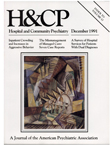Evaluation of a Maryland Fiscal Incentive Plan for Placing State Hospital Patients in Nursing Homes
Abstract
In Maryland a six-month fiscal incentive to promote nursing homes' acceptance of chronic patients discharged from state psychiatric hospitals was evaluated after one year. During the fiscal year of the incentive program, such placements (N=182) increased an average of 38 percent from previous years. Of 163 patients whose placements were evaluated, 22 were returned to the state hospital during the six-month period that the incentive was in place. Ten of the 22 were returned within 30 days of placement. Contrary to expectation, the return rate did not rise after the incentive was discontinued; four patients were returned during the second six months of the study period. Most returns during the first six months were due to patients' physical and verbal threats. The results supported the use of shortterm fiscal incentives and emphasized the importance of intensive supportive interventions with chronic mentally ill patients early in the nursing home placement.
Access content
To read the fulltext, please use one of the options below to sign in or purchase access.- Personal login
- Institutional Login
- Sign in via OpenAthens
- Register for access
-
Please login/register if you wish to pair your device and check access availability.
Not a subscriber?
PsychiatryOnline subscription options offer access to the DSM-5 library, books, journals, CME, and patient resources. This all-in-one virtual library provides psychiatrists and mental health professionals with key resources for diagnosis, treatment, research, and professional development.
Need more help? PsychiatryOnline Customer Service may be reached by emailing [email protected] or by calling 800-368-5777 (in the U.S.) or 703-907-7322 (outside the U.S.).



